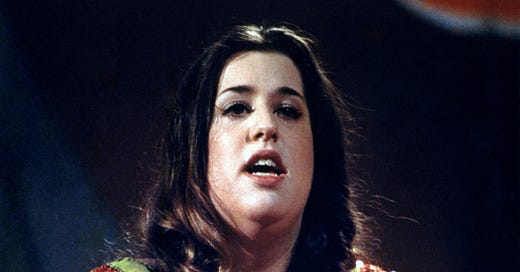
Mama Cass Through Her Daughter’s Eyes
Sorting through the legacy—and the legends—surrounding the Mamas & the Papas star who died young.
My Mama, Cass
A Memoir
by Owen Elliot-Kugell
Hachette, 262 pp., $30
HER IMAGE IS AS INDELIBLE AS HER SOUND: Mama Cass—Cass Elliot—in a pastel caftan, self-assured, earthy, and commanding the stage. The sound of her voice perfectly suited her time, the decade spanning the second half of the 1960s into the first half of the ’70s. So much so that she is one of the singers many of us hear when we remember those days, when American pop music was perhaps at its most eclectic. Her story has been told before, but never from the perspective of her only child, Owen Elliot-Kugell, who was 7 years old when her mother died in London at the age of 32. Part biography and part memoir, her book concentrates on the intertwining of her life and her mother’s. “So many stories began in her life,” she writes, “and then continued into mine to reach their conclusions.”
Born in Baltimore in 1941, Ellen Naomi Cohen grew up in a lively and loving musical home in the suburbs of Washington, D.C. From her father Philip she received the nickname Cassandra, and it was by the shortened form Cass that she came to be known. (The Elliot part of her name she chose herself, in tribute to a friend who had died.) Even as a girl two things about her became clear, two things that would stay with her throughout her life: she struggled with her weight; and she was drawn to performing. She was so confident of her abilities that, toward the end of high school, she vowed to her doubtful parents that she would give herself five years to make it.
In 1960 she moved to New York to pursue a career on Broadway, reportedly losing out on one role to another newcomer, Barbra Streisand. After a ten-week tour for a production of The Music Man, Elliot enrolled at American University and soon began frequenting Georgetown coffeehouses where folk music was played. At one of these she met a guitarist with whom she made a swing through Chicago. A third musician was added, forming a band called first the Triumvirate, then the Big 3. Elliot and company secured a manager and along with it a month-long job at the Bitter End in Greenwich Village. Here she met Denny Doherty, who joined her in a band called the Mugwumps. Doherty, who became one of her closest friends, eventually joined another band, the New Journeymen, led by John Phillips. Phillips was at first reluctant to consider the possibility of Elliot’s also joining the band. (“The real story,” writes Elliot-Kugell, “is that John didn’t like my mother’s look.”) But ultimately, she wore down his resistance, combining forces with him, his wife Michelle, and Doherty. These four were the Mamas & the Papas.
Success came quickly. Just months after signing a contract with Dunhill Records in 1965, the Mamas & the Papas recorded “California Dreaming,” their first hit. It would be joined on their first album, If You Can Believe Your Eyes and Ears, by “Monday, Monday,” the band’s only song to reach the top of the Billboard Hot 100.
During the two years they toured, the band played at venues including the Hollywood Bowl, Carnegie Hall, and the Monterey Pop Festival; appeared four times on The Ed Sullivan Show; and recorded two more albums. In 1967, the year Elliot gave birth to her daughter Owen, they won a Grammy for “Monday, Monday.” Nevertheless, as with many bands, tensions between members cropped up—affairs, conflicting personalities, artistic differences—and these caused them to stop touring. Two further albums were recorded, one of them featuring Elliot on a very successful cover of the 1931 song “Dream a Little Dream of Me.” This song, the one by which she is best known, launched her solo career.
NOW ON HER OWN, Elliot quickly recorded her first solo album for Dunhill in 1968. Two further Dunhill releases would follow, along with three on RCA. In discussing all these works, Elliot-Kugell gives special attention to songs written by her aunt—Cass’s sister—Leah, including “The Road is No Place for a Lady,” which also served as the title of her second RCA album. Elliot-Kugell also discusses the appeal of a song from her mother’s second solo album, “Make Your Own Kind of Music,” written by Barry Mann and Cynthia Weil. It was one of the first Elliot-Kugell remembers as distinctly featuring her mother. Over the years, fans of her mother’s music have repeatedly told Elliot-Kugell how inspired they were by its message.
Beyond her singing, Elliot revealed that she was an entertainer to be reckoned with. She had a pro’s sense of timing and could handle her own against the likes of Dick Van Dyke, Sammy Davis Jr., and other big-leaguers. She starred in two television specials. In addition to performing on The Tonight Show, she even occasionally filled in for Johnny Carson as host. She voiced herself in a Scooby-Doo cartoon, one in which her animated likeness saves the day by implausibly driving out monsters with a forklift. She showed up on a Dean Martin roast of Carroll O’Connor, skewering “Archie Bunker” for his shabby treatment of women. As a member of the Mamas & the Papas, she had enjoyed popularity before, but now she was a solo attraction, in every sense a diva.
This is what audiences in London must have been expecting in July 1974. Elliot had an intense two-week stretch booked at the Palladium, performing twice a day, and all her shows were sold out. After her last show, she attended a birthday party for Mick Jagger, then returned to the flat she had rented. She went to bed and never woke up, dying of a heart attack. An urban legend that bizarrely became almost universally accepted—that she choked to death on a ham sandwich—was concocted, Elliot-Kugell later learned, by her mother’s manager, who feared for the reputation of his client. The story seemed more innocent than association with the dangers of “the rock-and-roll lifestyle” that had so recently cost the lives of “Jimi, Janis, and Jim.”
“WHAT DOES A SEVEN-YEAR-OLD understand about death?” Elliot-Kugell recalls how utterly confused she was upon learning what had happened. She went to live with her aunt Leah and her husband, the drummer Russ Kunkel. Bills began to pile up and her childhood home in Hollywood had to be sold. Because her aunt was concerned about her emotional development, Elliot-Kugell began meeting weekly with a therapist. For a time, at least, life seemed “stable and predictable, which was what I craved after so much upheaval.” Her adolescence, however, was tough. The worst of it was a two-and-a-half year stretch at a therapeutic boarding school in Massachusetts. At 18, she quit school altogether, worked jobs in fast food, then returned to California to live with her grandmother. Soon things began to look up for her.
Elliot-Kugell poignantly recalls a 1986 dinner with John Phillips, Michelle Phillips, and Denny Doherty—the first time the three bandmates had been together since Cass’s funeral some twelve years previous. It was on this night, which happened to be her nineteenth birthday, that she learned about her biological father. With the help of Michelle Phillips, Elliot-Kugell was able to find Chuck Day, a bass player who worked with the Mamas & the Papas in the summer of 1966. Meeting him was an almost surreal experience for her: “When the doorbell rang, and Chuck Day walked in, I knew instantly that we were connected though I still struggle to articulate exactly how that felt. When I looked at him, I saw my nose.” Elliot had wanted him to have no part in her life or the life of her daughter. Elliot-Kugell also learned that Day was present near her mother’s funeral, watching from across the street but too “afraid and overwhelmed” to come talk to his child—a fact that still “irks” her.
In good memoir fashion, Elliot-Kugell catalogues the comings and goings of the people in her own life. There was her marriage in 1991 to the songwriter Jack Kugell, the birth in 1999 of her daughter Zoe, the birth in 2002 of her son Noah. As for the goings, there were the deaths of John Phillips in 2001 and Denny Doherty in 2007. Her biological father died in 2009. Elliot-Kugell also records events commemorating her mother’s life and career. In 1998, the Mamas & the Papas were inducted into the Rock and Roll Hall of Fame. In 2022, Elliot was posthumously honored with a star on the Hollywood Walk of Fame. Speaking at the ceremonies, her daughter reflected on the deaths of influential musicians like her mother: “she has never really left us, because her voice, and the music that she was a part of creating lives on today, across the world.”
Near the end of the book, Elliot-Kugell relates an experience she had of being near her mother’s star on the Hollywood Walk of Fame. A woman was passing through, scanning the ground for the names of famous people. Pausing in recognition at Elliot’s star, this woman reached for her phone to take a picture. Unnoticed, Elliot-Kugell remembers how “awesome” it was to see the lasting effect of her mother’s art. It has now been fifty years since Cass Elliot left the world, but she is remembered. “She,” her daughter concludes “was quite a woman.” And so she was: a singer who captured something permanent about her time by making her own kind of music.

















